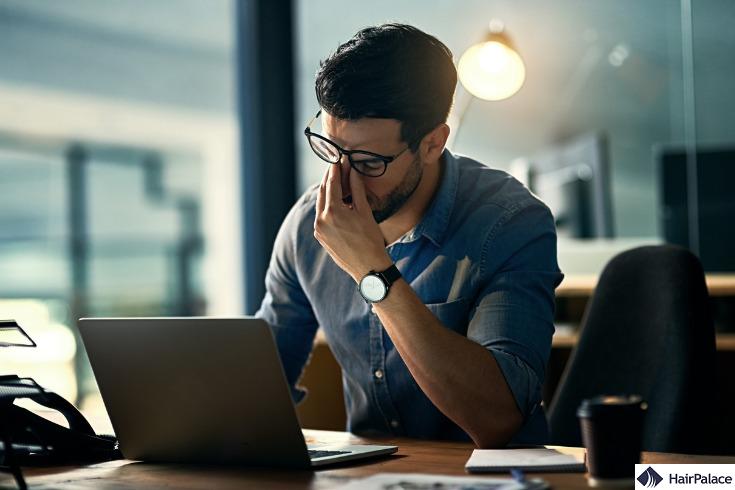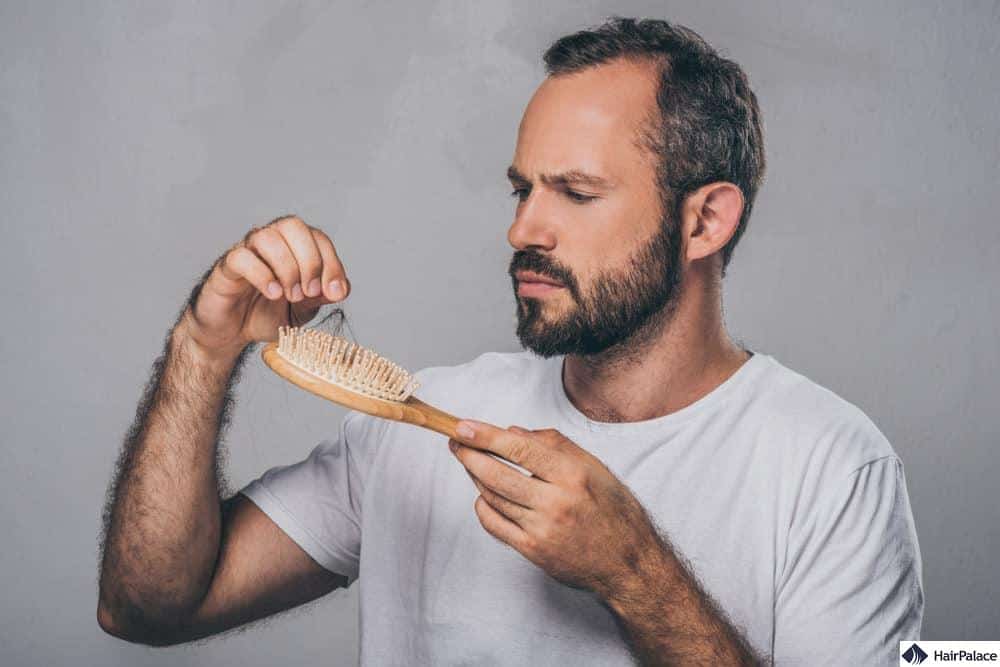Can Stress Cause Hair Loss?

Stress is a widespread feeling we all have faced at some point and time.
Research has shown up to 75% of adults in the UK have experienced it at some point.
Not only does it ruin our mood, increase anxiety and lead to headaches and nausea, but stress can also disrupt regular bodily functions like our appetite and sleep routine.
But one of the main concerns over stress is around our hair.
There is mounting evidence that suggests increased levels of stress can lead to an increase in hair loss.
In this article, we’ll explore whether stress-induced hair loss is a reality in your life or not.
- Can it cause hair loss?
- Types
- Symptoms
- Is it permanent?
- Management
- Other potential causes
- Conclusion
Can stress cause hair loss?
We often think of stress as purely psychological, which only happens in our heads.
But in reality, stress triggers several adverse effects across our entire body, including headaches, muscle tension, and breathing difficulties and negatively impacts our mood, appetite, and sleep hygiene.
However, long periods of stress can lead to increased levels of a harmful hormone called Cortisol.
This hormone has been linked to increased hair loss in people.

3 Types of hair loss related to stress
Hair loss can be a devasting thing to endure, regardless of age, gender, or hair health.
And while conditions like androgenetic alopecia and male pattern baldness account for most cases of hair loss, many people lose their hair because of one thing – high stress levels.
Three conditions, in particular, are stress-induced. They are:
1. Telogen effluvium
Telogen effluvium is perhaps the most common condition relating to stress.
This is when hair across your entire scalp can enter into an early resting phase, disrupting the natural hair growth cycle.
In most cases, hair loss from telogen effluvium is temporary, and once you relieve stress levels, hair can recover after six to nine months.
2. Alopecia areata
Alopecia areata is an autoimmune disease where your body’s immune system mistakenly attaches healthy follicles. The result?
Patches of baldness develop across the scalp, inflammation, and tenderness.
Given time, hair can recover over long periods, but extensive cases may require professional treatment.
3. Trichotillomania
Trichotillomania is a psychological condition where a person experiences an irresistible urge to pull out their hair.
Many believe this condition is linked to stress because pulling out hair can be seen as a way to manage anxiety and upset in certain people.
You can only begin to stop hair-pulling and manage symptoms by reducing stress levels and developing healthy habits to redirect your anxiety.
What are the symptoms of stress-induced hair loss?
Because we lose hair each day, it can be challenging to know if your scalp and hair are suffering from stress.
Keep a close eye on the following symptoms:
- Unexpected hair loss
- Hair loss across the body, including facial and body hair
- Bald patches develop suddenly
- You’re after experiencing an incredibly stressful event
Is stress-related hair loss permanent?
In most cases, hair loss that stems from stress usually grows back, though regrowth rates vary from person to person.
By managing your stress, you can eliminate the cause of hair loss and hopefully restore your hair to its former glory.
One of the influencing factors of recovery will be what stage of the hair growth cycle your follicles are currently in.
The average scalp has over 100,000 follicles, all of which can be in different phases.
They are:
- Anagen phase: This is the active growing phase. Cells rapidly divide to accelerate new growth. It usually lasts between 2 to 7 years.
- Catagen phase: This transitional phase lasts two weeks and sees the hair cut off from its blood supply. The follicle begins to shrink.
- Telogen phase: This is the resting phase for hair and can last up to three months.
- Exogen phase: The final phase is when hair sheds from your scalp. It can last two to five months, after which hair follicles re-enter the Anagen phase.
Three hair loss treatments for stress
Reducing stress in our lives can be a challenge in and of itself.
It can be hard to rise above our bad feelings and make time for ourselves.
But if you are losing hair at an alarming rate, you must at least try to destress yourself.
Below are three ways to treat stress.
They won’t remedy your situation immediately, and you may need a combination of all three to recover fully.
But by trying these methods, you will improve not only your hair but your quality of life, too
1. Stress management
There are many ways to manage and alleviate stress in your life. Some popular methods include:
- Exercise: Physical exercise releases endorphins which help reduce stress and boost mood. Something as simple as a light walk, yoga, stretches, or doing household chores can work for you.
- Hobbies: Set part of your week aside to do something you enjoy, like taking up a new hobby, like a sport or art class, to doing simple things around the house that you enjoy – but might overlook. Examples include outside gardening, redecorating, cooking, or enjoying a good book.
- Nutrition: Hair needs various nutrients and minerals to support new growth. Consider eating a balanced diet to give everything your hair needs. Try incorporating more protein, Vitamin E, and whole foods into your meals. These foods will help build new hair and raise energy levels, which can boost your mood.
- Meditation: There are a variety of meditative techniques that people use every day to help calm themselves and decrease stress. These can include breathing exercises, yoga, simple stretches, listening to relaxing music, and going for a gentle walk.
2. Diet and nutrition
A balanced diet is at the core of a healthy mind and body. What we eat significantly impacts how our cells, including hair follicles, grow.
Vitamins, minerals, and food groups help promote hair growth and simultaneously boost mood. Some of the most critical include:
- Vitamin C: This vitamin helps produce collagen, a protein essential for building connective tissue in the body, including the hair follicle. Foods rich in Vitamin C include fruits like oranges and strawberries and vegetables like broccoli and bell peppers.
- Vitamin E: Vitamin E reduces oxidative stress in the scalp and helps preserve the protective lipid layer on the hair. This bolsters your hair’s natural defenses, preventing it from falling out early. Foods rich in Vitamin E include spinach, olive oil, broccoli, sunflower seeds, and seafood like shrimp.
- Vitamin B: Vitamin B is a collective of many different vitamins that help promote normal cell function around the body. B Vitamins like Biotin and Folic acid, for example, can help increase hair growth and density. To increase your intake, consider eating various beans, nuts, and dark leafy greens.
- Hydration: Water is an essential ingredient to a healthy body, helping keep us cool and hydrated and boosting our mood. Because hair absorbs water, drinking more daily can improve texture and appearance. Men should drink up to 15 ½ cups of water daily, while women should aim for 11 ½ cups.
- Supplements: If you’re finding it difficult to increase the number of nutrients, minerals, and foods in a healthy diet, food and drink supplements may benefit you. It would be best to seek professional medical advice from your doctor before taking these, as some products may be unsuitable for you or have little effect.
3. Topical treatments
Several topical ointments, creams, and other haircare products have been known to combat hair loss and stress levels in one effective treatment.
Some of the most popular include:
- Topical Minoxidil: Topical minoxidil is an over-the-counter medication that helps prolong your hair’s growth phase. Some patients may need to use it consistently for up to four months to see results.
- Topical corticosteroids: These are applied directly to the skin and are thought to have anti-inflammatory properties that help stress-related hair loss conditions like alopecia areata. Quite often, they’re used in conjunction with other treatments.
- Castor oil: Certain folk remedies like castor oil are believed to help promote hair growth by moisturizing the scalp, lubricating hair strands, and improving their flexibility. That said, more scientific studies are required to support these claims.
What if you don’t see improvement?
Although you might feel stressed, there is the chance that the hair loss you are currently experiencing isn’t directly related. Other factors which may lead to hair loss include:
- Growing older
- Poor genetics
- Undergoing chemotherapy
- Hormonal changes, e.g., childbirth, pregnancy, or menopause
- Nutirtional deiciences
- Retrograde alopecia
Side effects of certain medications, like blood thinners and antidepressants
The bottom line
Unfortunately, stress is a natural part of life. Sometimes, we feel pressured, tired, and worried, which can all add up and dramatically affect our bodies.
Prolonged periods of stress can dramatically affect our hair, disrupting the natural growth cycle and leading to premature hair loss.
But you aren’t defenseless against this, as most hair loss of this nature is temporary.
By making small changes to your diet and lifestyle, destressing through physical activity, or using topical treatments, you can help your body destress, rest and recover quickly.
You’ll not only feel better by ridding yourself of chronic stress, but your hair will become thicker and more resilient as a result.
Stress Hair Loss FAQ
On average, we stand to lose 50 to 100 hairs daily. But if you notice patchy hair loss developing, this could be alopecia areata occurring, which can be stress-induced.
Additionally, certain behaviors, such as trichotillomania (hair pulling), can be triggered by intense feelings of stress.
Anxiety or stress is most likely only going to cause temporary hair loss. This is because the hair follicle is not damaged or tampered with during stress. It will stimulate new growth once you’ve reduced stress and hair has left the telogen phase.
There are three conditions frequently linked to stress-induced hair loss. The most common is Telogen effluvium, where high-stress levels push hair follicles into an early and prolonged resting phase. Sufferers can expect an increasing amount of hair falling out. Additionally, alopecia areata and trichotillomania may also result from stress.
Stress and anxiety often come hand-in-hand. High levels of anxiety can cause stress and vice versa. For that reason, yes, anxiety can cause you to experience further hair loss.
Last medically reviewed on July 29th, 2024
- 10 stress busters, NHShttps://www.nhs.uk/mental-health/self-help/guides-tools-and-activities/tips-to-reduce-stress/
- Bishop S. (2013). Stress may play a role in hair loss, but other triggers could be the cause.
- van der Steen P, Boezeman J, Duller P, Happle R. Can alopecia areata be triggered by emotional stress? An uncontrolled evaluation of 178 patients with extensive hair loss. Acta Dermato-venereologica. 1992 Aug;72(4):279-280. DOI: 102340/0001555572279280. PMID: 1357886.
- Melinda A. Novak, Amanda F. Hamel, Amy M. Ryan, Mark T. Menard, Jerrold S. Meyer, The Role of Stress in Abnormal Behavior and Other Abnormal Conditions Such as Hair Loss, 2017
- Chamberlain SR, Odlaug BL, Boulougouris V, et al.: Trichotillomania: neurobiology and treatment. Neurosci Biobehav Rev 2009; 33:831–842
- S. Harrison, R. Sinclair, Telogen effluvium, Clinical and Experimental Dermatology, Volume 27, Issue 5, 1 July 2002, Pages 389–395, https://doi.org/10.1046/j.1365-2230.2002.01080.x
- Wasserman, Dan, et al. "Alopecia areata." International journal of dermatology 46.2 (2007): 121-131.


